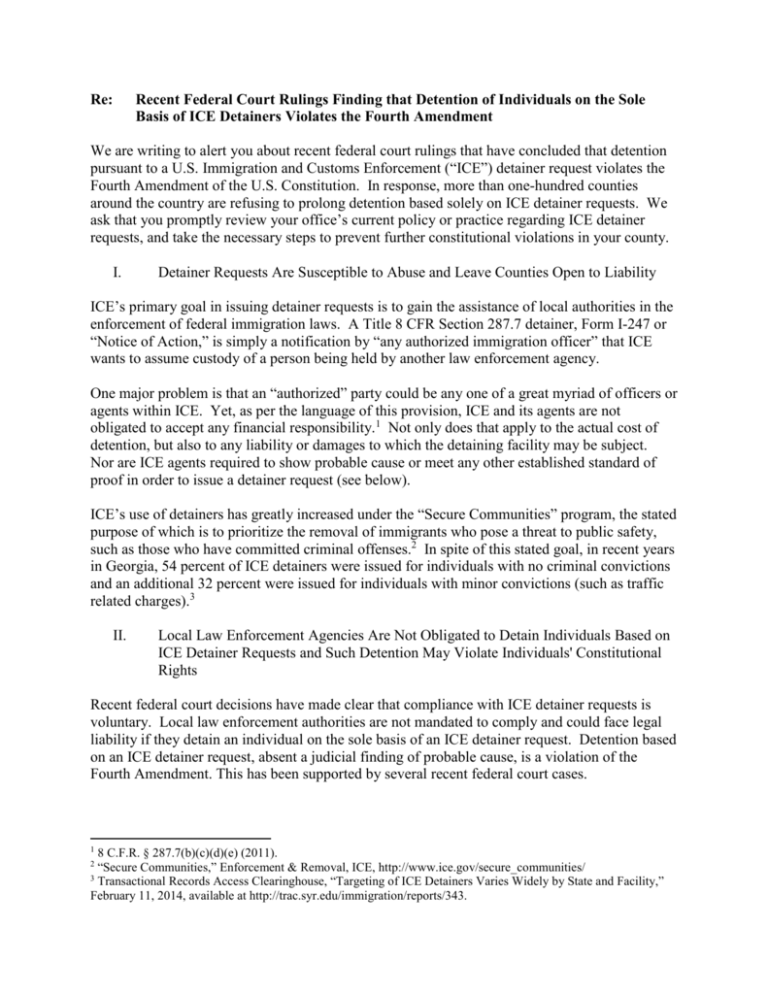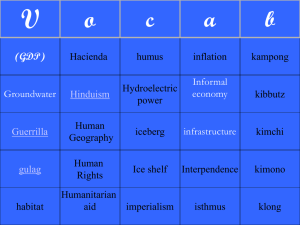here - Southerners On New Ground
advertisement

Re: Recent Federal Court Rulings Finding that Detention of Individuals on the Sole Basis of ICE Detainers Violates the Fourth Amendment We are writing to alert you about recent federal court rulings that have concluded that detention pursuant to a U.S. Immigration and Customs Enforcement (“ICE”) detainer request violates the Fourth Amendment of the U.S. Constitution. In response, more than one-hundred counties around the country are refusing to prolong detention based solely on ICE detainer requests. We ask that you promptly review your office’s current policy or practice regarding ICE detainer requests, and take the necessary steps to prevent further constitutional violations in your county. I. Detainer Requests Are Susceptible to Abuse and Leave Counties Open to Liability ICE’s primary goal in issuing detainer requests is to gain the assistance of local authorities in the enforcement of federal immigration laws. A Title 8 CFR Section 287.7 detainer, Form I-247 or “Notice of Action,” is simply a notification by “any authorized immigration officer” that ICE wants to assume custody of a person being held by another law enforcement agency. One major problem is that an “authorized” party could be any one of a great myriad of officers or agents within ICE. Yet, as per the language of this provision, ICE and its agents are not obligated to accept any financial responsibility.1 Not only does that apply to the actual cost of detention, but also to any liability or damages to which the detaining facility may be subject. Nor are ICE agents required to show probable cause or meet any other established standard of proof in order to issue a detainer request (see below). ICE’s use of detainers has greatly increased under the “Secure Communities” program, the stated purpose of which is to prioritize the removal of immigrants who pose a threat to public safety, such as those who have committed criminal offenses.2 In spite of this stated goal, in recent years in Georgia, 54 percent of ICE detainers were issued for individuals with no criminal convictions and an additional 32 percent were issued for individuals with minor convictions (such as traffic related charges).3 II. Local Law Enforcement Agencies Are Not Obligated to Detain Individuals Based on ICE Detainer Requests and Such Detention May Violate Individuals' Constitutional Rights Recent federal court decisions have made clear that compliance with ICE detainer requests is voluntary. Local law enforcement authorities are not mandated to comply and could face legal liability if they detain an individual on the sole basis of an ICE detainer request. Detention based on an ICE detainer request, absent a judicial finding of probable cause, is a violation of the Fourth Amendment. This has been supported by several recent federal court cases. 1 8 C.F.R. § 287.7(b)(c)(d)(e) (2011). “Secure Communities,” Enforcement & Removal, ICE, http://www.ice.gov/secure_communities/ 3 Transactional Records Access Clearinghouse, “Targeting of ICE Detainers Varies Widely by State and Facility,” February 11, 2014, available at http://trac.syr.edu/immigration/reports/343. 2 In Galarza v. Szalczyk, a man successfully sued the county that had prolonged his detention on the basis of an ICE detainer request, for violating his constitutional rights. In November 2008, Ernest Galarza was arrested by Allentown police on a drug charge. Despite having a Pennsylvania Driver’s License and Social Security card, ICE was contacted. He was subsequently detained in Lehigh County Prison, even after posting bail, pursuant to an ICE detainer request. The Third Circuit noted that the term “detainer” is referred to by past Court of Appeals decisions, in policy statements by ICE itself, and by language approved by Congress in 8 U.S.C. §1357(d) as simply a request.4 Further, the court asserted that even if the use or meaning of “detainer” is ambiguous, under the Tenth Amendment, a federal agency may not commandeer a state or local agency to enforce federal interests: “The federal government cannot command the government agencies of the states to imprison persons of interest to federal officials.”5 Therefore, the Third Circuit Court of Appeals held that 8 C.F.R. §287.7 only authorizes ICE to issue a detainer as a request, a detainer does not compel or require law enforcement agencies to detain suspected noncitizens subject to deportation – not even for 48 hours.6 The city and county violated Mr. Galarza’s constitutional rights voluntarily because they had the option to disregard the request. Therefore, the court held that it would not be an acceptable defense to claim it Mr. Galarza’s rights were violated as a result of federal policy, not local (city or county) policy.7 On remand, the case was settled out of court. The United States and the City of Allentown collectively paid $50,000 and Lehigh County paid $95,000 in damages and fees.8 The decision in Miranda-Olivares v. Clackamas County9 echoed the holding in Galarza that detainer requests alone are not sufficient to meet probable cause standards. In this case, Maria Miranda-Olivares was detained for two weeks, denied the opportunity to post bail, and even after she pleaded guilty and a judge ruled she had satisfied her charges with time already served, she was detained at the jail for an additional 19 hours. The court held that once she had been released from state charges, her continued detention under the ICE detainer request constituted a new or subsequent arrest, for which a lack of probable cause would violate her constitutional rights.10 The ICE detainer that the county had been relying upon stated that ICE was initiating an investigation into Miranda-Olivares’s legal status in the United States, and requested that the county hold her until ICE could assume custody. The court held that a request to detain pending an investigation or to give time for ICE to assume custody, when the county’s own legal jurisdiction over the individual has ended, does not constitute probable cause, and is therefore a violation of the Fourth Amendment.11 The court ruled that the county would have to pay a to-bedetermined amount in damages for violating Ms. Miranda-Olivares’s constitutional rights. 4 Id. at 640-42. Id. at 643. 6 Id. at 645. 7 Id. at 645. 8 “Galarza v. Szalczyk,” American Civil Liberties Union: Immigrants’ Rights, June 18, 2014, https://www.aclu.org/immigrants-rights/galarza-v-szalczyk. 9 2014 U.S. Dist. LEXIS 50340 (D. Or. Apr. 11, 2014). 10 Miranda-Olivares, 2014 U.S. Dist. LEXIS 50340 at 27-28. 11 Id. at 32-33; See Arizona v. United States, 132 S. Ct. 2492, 2509 (U.S. 2012) ("Detaining individuals solely to verify their immigration status would raise constitutional concerns."). 5 The Fourth Amendment protects from unreasonable search and seizures – it requires a warrant or judicially supported order establishing probable cause. In Morales v. Chadbourne12 Ada Morales was detained without probable cause pursuant to an ICE detainer. The court said probable cause requires that “specific facts and circumstances” exist such that a “prudent person” could reasonably conclude that an individual, such as Ms. Morales, was a non-citizen subject to deportation.13 The court reiterated that, “the fact that an investigation had been initiated is not enough to establish probable cause because the Fourth Amendment does not permit seizures for mere investigations.”14 Additionally, the court held that a detainer does not amount to a warrant.15 In sum, any law enforcement agency that maintains a policy or practice of detaining individuals on ICE detainer requests not supported by a judicial finding of probable cause violates the Fourth Amendment and may be held liable for damages under 42 U.S.C. § 1983. III. Counties Across the Country Are Refusing to Detain Individuals on the Basis of ICE Detainers in Light of Recent Holdings that Raise Constitutional Concerns In response to the federal court holdings described above, jurisdictions around the country are recognizing that ICE detainer requests are not a valid basis for prolonging individuals’ detention beyond the time when they would otherwise be eligible for release from state or local custody (e.g., after posting bond, or when the criminal charges against them are resolved). Well over 100 counties in Oregon, Washington, California, Colorado, Pennsylvania, Minnesota, Kansas, Iowa, and New Mexico have ceased to hold anyone on the sole basis of an ICE detainer request. These counties recognize that detention per an ICE detainer request unaccompanied by a judicial finding of probable cause violates the Fourth Amendment. A violation of an individual’s constitutional rights subjects counties to liability and potential damages. Six counties in Kansas – Shawnee, Johnson, Finney, Sedgwick, Butler, and Harvey – have changed their policies to require probable cause before agreeing to detain individuals past the time that they become eligible for discharge.16 Brian Cole, Director of the Shawnee County Department of Corrections stated, “We have ceased recognizing any ‘probable cause’ authority in the I-247 form, and have notified ICE of our decision. It is our desire never to hold a person beyond the period for which proper lawful authority exists.”17 12 2014 U.S. Dist. LEXIS 19084 (D.R.I. Feb. 12, 2014). Morales v. Chadbourne, 2014 U.S. Dist. LEXIS 19084 at 46. 14 Id. at 17. 15 Id. at 48 (“Warrants are very different from detainers and there was no accompanying warrant in this case.”). See also Buquer v. Indianapolis, 797 F. Supp. 2d 905, 911 (S.D. Ind. 2011) ("A detainer is not a criminal warrant, but rather a voluntary request that the law enforcement agency 'advise [DHS], prior to release of the alien, in order for [DHS] to arrange to assume custody.'"). 16 Brian Dulle, 3 Kansas counties limit holds on ICE detainees, Kansas First News (June 10, 2014 1:39pm), http://kansasfirstnews.com/2014/06/10/3-kansas-counties-limit-holds-on-ice-detainees. 17 Ann Marie Bush, ACLU: Shawnee County Jail to Stop Holding Immigrants Without Probable Cause, The Topeka Capital-Journal Online (June 9, 2014, 1:59pm), http://cjonline.com/news/2014-06-09/aclu-shawnee-county-jail-stopholding-immigrants-without-probable-cause. 13 Hennepin County, the largest in Minnesota, recently joined in refusing to detain individuals on ICE detainer requests.18 In addition to the added cost to taxpayers of approximately $170,000 since 2012, Sheriff Stanek does not want to take on the liability.19 The Mayor of Minneapolis, Betsy Hodges, supports this change in policy, stating that, “it is essential that localities begin to refuse to bear the consequences of politicians’ failure to act.”20 Other Minnesota counties are also persuaded by the actions of Hennepin County. Ramsey County released a statement that it will not honor ICE detainer requests, and Dakota County says it is likely to follow suit.21 One of the most recent jurisdictions to join the wave of counties implementing no-detainers policies is Doña Ana County in New Mexico. On the heels of a lawsuit against the county for detaining two sisters on a “48-hour” detainer request for two months, County Manager Julia Brown decided to end compliance with ICE detainer requests.22 She claims the policy change is not in response to the lawsuit, but instead in light of the federal ruling that detainer requests are not mandatory. However, the $55,000 settlement was likely helpful in coming to the realization that continuing to prolong individuals’ detention per ICE detainer requests could expose Dona Aña to significant liability.23 Similarly, Arapahoe County in Colorado agreed to an out-of-court settlement obligating the county to pay $30,000 to Claudia Valdez.24 Local law enforcement arrested Ms. Valdez after she had called the police for help during a violent domestic dispute. Even after a judge ordered her release, the county held her for three days pursuant to an ICE detainer request. Once a lawsuit was about to be filed, the county decided to settle. IV. Georgia Law Does Not Require or Authorize Counties to Detain Individuals Based Solely on ICE Detainer Requests Georgia’s Illegal Immigration Reform and Enforcement Act of 2011 (commonly referred to as HB 87) does not require the detention of an individual on the sole basis of an ICE detainer request unsupported by a judicial finding of probable cause. While there are provisions that prevent counties from restricting or interfering with ICE’s ability to carry out the enforcement of federal immigration laws, such as limiting communication or information-sharing between local officers and federal immigration agents, adopting a policy declining to prolong detention without probable cause does not pose a conflict with HB 87. Local law enforcement agencies are able to exercise their discretion in deciding how to respond to ICE detainer requests. Therefore, adopting a policy declining to prolong detention without a Hennepin County Sheriff’s Office News Release, June 11, 2014, http://www.aclumn.org/files/4214/0251/2290/06_11_2014_Sheriff_Stanek_Statment_on_ICE_detainers.pdf. 19 David Chanen, Hennepin County No Longer Will Honor ‘ICE Hold’ Requests, Star Tribute (June 11, 2014, 11:20pm), http://www.startribune.com/local/minneapolis/262719361.html. 20 Id. 21 Id. 22 Associated Press, New Mexico Border County to End Immigration Holds, Washington Times (June 18, 2014), http://www.washingtontimes.com/news/2014/jun/18/border-new-mexico-county-to-end-immigration-holds/ 23 Id. 24 Colorado Sheriff to Pay $30K to Woman Held on Immigration Detainer, American Civil Liberties of Colorado (June 19, 2014), http://aclu-co.org/colorado-sheriff-pay-30k-woman-held-immigration-detainer/ 18 judicial finding of probable cause is within their authority. In fact, HB 87 Section 13 makes clear that “[n]othing in this Code section shall be construed to deny a person bond or from being released from confinement when such person is otherwise eligible for release.” Ga. Code Ann. § 42-4-14. V. Counties Should Adopt a Clear Policy Refusing to Detain Individuals on the Basis of an ICE Detainer Request Without a Judicial Finding of Probable Cause; Detention is Not to Exceed 48 Hours Under Any Circumstances Even in cases where a detainer request is substantiated by probable cause, prolonging the detention of an individual for longer than 48 hours, excluding weekends and holidays, is prohibited. See 8 C.F.R. § 287.7(d). In light of these recent legal developments and significant shifts in policy, we urge you to adopt a policy declining to prolong the detention of individuals on the basis of ICE detainer requests unless they are accompanied by a judicial determination of probable cause, as required by the Fourth Amendment. Sincerely,









